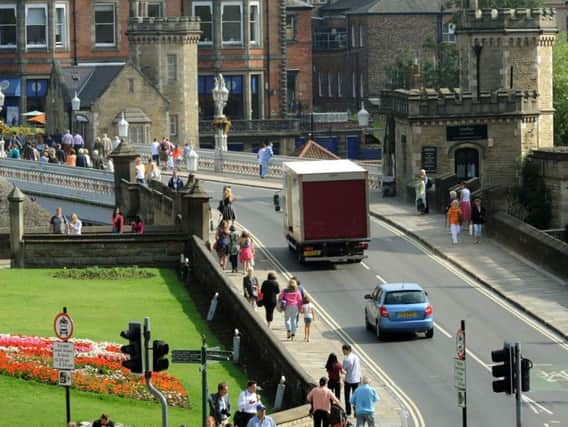Plans to ban private car journeys from York city centre by 2023


Councillors have outlined a goal to ban all non-essential journeys by 2023, barring such access around the city’s primary schools at drop-off and pick-up times.
Public transport should be good enough that most residents would not need to own a car by then, councillors argue, adding that those who “genuinely rely on cars” such as disabled residents would be exempt.
Advertisement
Hide AdAdvertisement
Hide Ad“People’s first response might be to be a bit anxious about what we’re proposing,” said Labour councillor Jonny Crawshaw. “But that doesn’t mean it’s not the right thing to do. The public mood is changing – particularly in relation to climate change.
“I want to reassure people living outside the city centre that this isn’t a proposal that seeks to stop them coming into town.
“Likewise for those living within the walls, we’re not trying to prevent you from accessing your homes or having a car.
“This is about reducing and removing non-essential car journeys across the whole city, whilst improving the range and attractiveness of alternative travel options.”
Advertisement
Hide AdAdvertisement
Hide AdThe move would help York Council meet its goal of becoming carbon neutral by 2030 and improve air quality, he added.
“Fewer cars on York’s roads would enable faster, more reliable public transport from the suburbs and villages into the city centre,” he added. “Fewer cars on the roads would make cycling feel safer and more viable option for more people.”
Past controversy
There was major controversy in 2013 after Lendal bridge was closed to traffic, in a move eventually overturned after being branded by opposition leaders as a “botched trial from the start”.
Tens of thousands of drivers had been issued with fines, with a traffic adjudicator later deciding that rules hadn’t been adequately signposted.
Advertisement
Hide AdAdvertisement
Hide AdLast month, councillors put forward a tree planting policy which could see 50,000 saplings planted over three years to help tackle climate change, boost wildlife and lower flood risks.
Now a clean air zone is launched in the city this month, backed by £1.64m to help bus companies make vehicles more environmentally friendly.
Under the new plans, York Council will look to stop all non-essential private car journeys, and ban all non-essential cars from accessing roads around the city’s primary schools at drop-off and pick-up times. It would work with disability groups and Blue Badge holders to ensure they can still access the city, councillors agreed, as well as businesses.
Lib Dem councillor Christian Vassie, chair of the council’s climate change committee, supported the scheme but warned councillors: “Banning cars is not the difficult bit. What are we putting in its place? How much are we prepared to invest in a future that provides a low carbon alternative?”
Advertisement
Hide AdAdvertisement
Hide AdCoun Stephen Fenton called for extra consultations to be launched on the plans, and said the closure of Lendal Bridge in 2013 “does cast a shadow over this debate”.
He added: “I support this plan. But restricting and reducing car journeys will inevitably have a number of implications for those living in the city.
“We need to understand the reasons for journeys into, within and around the city, to what extent they are classed as essential and where are the gaps we need to fill to make this a reality.”